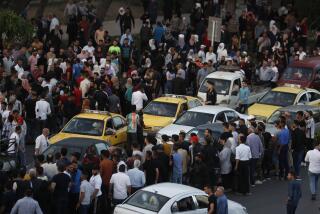Syrian president’s cousin pushes for democratic change
Reporting from London — His family name is both help and handicap for Ribal Assad as he tries to push for democratic change in his homeland, Syria.
Assad is a cousin of Syrian President Bashar Assad, whose repressive regime is under heavy pressure from pro-democracy protesters at home and from Western nations angry over the bloody crackdown he has mounted in response.
As a member of the clan, Ribal Assad, 36, occupies a compelling position from which to speak out against the abuses of his cousin’s government.
But his position is also a controversial one. His father, Rifaat, once Syria’s vice president before being banished from the country, is accused of directing a 1982 military assault on Sunni Muslims in the city of Hama in which as many as 20,000 people were killed. Ribal’s insistence on his father’s innocence has incensed many Syrian dissidents.
Ribal, a London-based businessman with interests in China, heads two organizations whose stated aims are to promote democracy and religious tolerance in Syria and the Middle East.
Has the situation in Syria now passed from peaceful protest to armed revolt?
This has started awhile ago. In the beginning you had a lot of peaceful protesters from all over Syria. All ethnicities, all sects, all religions came out. They’ve seen what’s happened in Tunisia, Egypt, Libya, Yemen, Bahrain.... They want freedom, dignity, freedom of association, all of that.
The regime did not want to understand that. They said, “We are different from those countries.” … Once blood is spilled, it’s very difficult to get a grip on things, because they evolve very quickly.
If Bashar is toppled, how great would be the risk of widespread sectarian strife?
He doesn’t need to be toppled; there is a huge risk now. If things continue the way they are, there is a huge risk we could have a sectarian war that could lead to a regional war. Syria is not isolated. It’s not like Libya. Syria has allies like Lebanon, Hezbollah.
They also have the Iranian government.... Iran will not allow the regime to fall. They’ve invested so much in that regime. And strategically for them, Syria is very important.
You’ve called Syria a “vassal state” of Iran. But how realistic is it that Damascus will ever sever its close ties to Tehran?
The only way that Syria will be able to get away from the Iranian influence is if Syria has a strong national unity government. They have to have national reconciliation, national unity government, everybody working together for a better future…. And they will see that their future is better having allies in the West and not in Iran.
Do you understand why the West and NATO haven’t given more assistance to the protesters?
Nobody wants any military intervention. That would be chaotic. The Syrian opposition … should not even think about that. The international community knows very well that Syria is not Libya. Syria has a lot of allies. [A military operation] in Syria would not stay within Syria’s borders.
The best way is to pressure the government, to make them sit with all the opposition groups, have a national dialogue. Start reforming right away, a process … that should be overseen by the international community.
Will Bashar be more determined to hang on now that he’s seen what’s happened to [Libyan leader Moammar] Kadafi?
They shouldn’t have waited until now. They have seen already Saddam’s end [in Iraq]. They should have understood you cannot rule this way. We live in the 21st century.
People even in democracies cannot stand the same face [all the time].... They want change. They have a right to that. All those regimes should have learned that in the end, when you choose to suppress and repress people, you’ll never have a good end.
So should Bashar step down?
If he starts reform right away, if he stops the violence right away, if we start a national reconciliation, create a national unity government, then for this interim period, until our next elections, [he can stay] as a transition. [But] it’s been seven months. We’re at an impasse. Nothing’s happening. A lot of countries have told him to go; he didn’t....
When he came in, he wanted to do some reforms. He launched a “Damascus Spring.” And suddenly he stopped. He stopped because people in the security apparatus started getting scared. This is what is happening again today.
Plenty of Syrians blame your father for the massacre in Hama and do not want to see your family take a role in Syria’s future.
Why do they always focus on my father? My father said many times, “I had nothing to do with what happened in Hama.” … The regime blames him for everything. They needed a scapegoat. Did corruption stop when my father left the country? No, it got a million times worse. Did they stop torturing people? Nothing stopped. It got nothing but worse.
Some people abroad, they just have this hatred and grudge. The same thing inside Syria…. If we want to build the future of our country, we cannot build it on grudges.
But people will want an accounting for past injustices.
People on all sides have suffered…. All those people need an accounting. We cannot forget; we have to learn from our past mistakes. But we have to be able to forgive each other, because this is our country. At the end of the day, we’re going to be living together.
A lot of [Syrian dissidents] have lived here in the West for 30 years. They don’t know anything about democracy. They think democracy is “We go back, we take power and then we show the rest what’s going to happen.” All people have to be protected under the rule of law. People are equal under the rule of law, regardless of their religion, their ethnicity, their sect, their sex....
I think that Syria and the whole region, the Middle East, is a beautiful mosaic of people. It should not be seen as a weakness by the Syrian people. It’s not a weakness; it’s a strength.
Look at a country like the U.S. It’s strong because it’s so diversified. You have people of all nationalities, from all religions, all sects, living together, working for the better of their country.
More to Read
Sign up for Essential California
The most important California stories and recommendations in your inbox every morning.
You may occasionally receive promotional content from the Los Angeles Times.











